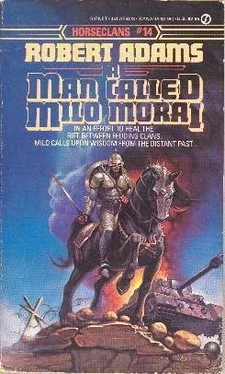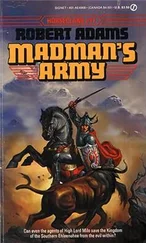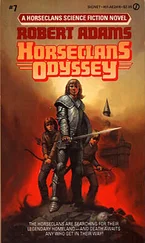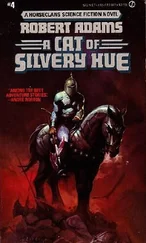Robert Adams - A Man Called Milo Morai
Здесь есть возможность читать онлайн «Robert Adams - A Man Called Milo Morai» весь текст электронной книги совершенно бесплатно (целиком полную версию без сокращений). В некоторых случаях можно слушать аудио, скачать через торрент в формате fb2 и присутствует краткое содержание. Жанр: Фантастика и фэнтези, на английском языке. Описание произведения, (предисловие) а так же отзывы посетителей доступны на портале библиотеки ЛибКат.
- Название:A Man Called Milo Morai
- Автор:
- Жанр:
- Год:неизвестен
- ISBN:нет данных
- Рейтинг книги:3 / 5. Голосов: 1
-
Избранное:Добавить в избранное
- Отзывы:
-
Ваша оценка:
- 60
- 1
- 2
- 3
- 4
- 5
A Man Called Milo Morai: краткое содержание, описание и аннотация
Предлагаем к чтению аннотацию, описание, краткое содержание или предисловие (зависит от того, что написал сам автор книги «A Man Called Milo Morai»). Если вы не нашли необходимую информацию о книге — напишите в комментариях, мы постараемся отыскать её.
A Man Called Milo Morai — читать онлайн бесплатно полную книгу (весь текст) целиком
Ниже представлен текст книги, разбитый по страницам. Система сохранения места последней прочитанной страницы, позволяет с удобством читать онлайн бесплатно книгу «A Man Called Milo Morai», без необходимости каждый раз заново искать на чём Вы остановились. Поставьте закладку, и сможете в любой момент перейти на страницу, на которой закончили чтение.
Интервал:
Закладка:
The little old man was tiny. Shorter than either son, neither of whom was of average height, shorter even than the girl, Kathleen. He wore thick-lensed, wire-framed spectacles high on the bridge of a Roman nose, was cleanshaven and utterly bald. He was slightly hunchbacked and peered up at Milo from dark eyes full of tears, and a lump of pity blocked Milo’s throat.
With the agreement of all concerned parties, the police were never summoned or even notified of the incident. When, a few days later, Jaan Brettmann emerged from the hospital, he was met by Sol, who gave him a packed suitcase, a one-way railroad ticket to Philadelphia, Pennsylvania, and the address of his father’s first cousin by marriage, Isaak Sobelsky, a jeweler. True to his word, Pat O’Shea saw Kathleen yanked from out the university and ensconced in the hospital nursing school, the only other option offered by her furious parents being Holy Orders. A week or so after his erring, youngest son had been sent off to well-earned exile in the East, old Mr. Brettmann suffered a stroke, which, though it did not quite kill him, left his entire right side paralyzed, useless, making Sol the sole support of his father, his aged mother and his two younger sisters.
As for Milo, he and Nurse Irunn Thorsdottar began to enjoy occasional days or evenings—dependent entirely on which shift she was working—out. After confiding to him her passion for the works of the musical masters, many of their sojourns were to the opera or the symphony, and he soon became familiar with the soul-stirring music of Wagner, Grieg, Beethoven and Sibelius.
The translating work really took up little time, and he made use of the rest of each day and of his work locale to voraciously read of past, of present, of imagined or projected futures of the world in which he lived, hoping against hope that some word or group of words, some photograph or painting reproduction in some book would trigger his memory that he might regain his lost past. He learned vast amounts about the world, about its history and accomplishments, but he could never remember any more of what he had done, had been, before his clubbing than he had on that morning in the hospital, in the depths of the winter now past.
On each succeeding visit to the office of Osterreich’s group, Milo noted that Sol Brettmann looked more worn with exhaustion and care and worry. In order to pay the medical costs, to keep food on the table, clothes on the family’s backs, his sisters in public high school and the rent paid on the family flat above the sometime tailor shop, Sol had dropped out of his almost-completed law-school program and taken a second job, a night job selling—or, rather, trying to sell—life insurance.
One day, on the day when he was scheduled to collect his pay for translations completed, young Brettmann took Milo aside and pressed,a wrinkled and stained envelope into his hand. Inside it, Milo found a sheaf of crisp new ten-dollar bills, ten of them in all.
“This will, I hope, recompense you for the money my brother induced the O’Shea girl to steal of you.”
“Now, damn it all, Sol,” expostulated Milo, “you can’t afford to part with this money, you know it and I know it. How the hell did you get so much together so soon, anyway?”
Brettmann flushed darkly, hung his head and replied, “I … I knew that I … that we, the family, would be years, maybe, in getting that much … now, with Papa and all. I borrowed it from … from Mijnheer Doktor Osterreich. And he wouldn’t even talk of any interest on the loan. He is a truly good man.”
“Then you just give it back to Sam Osterreich, Sol. You do or I will. You owe me nothing, hear? You and your family aren’t in any way responsible, so far as I’m concerned, for what your nutty, deluded brother did or tried to do.”
Brettmann’s thin lips trembled. “But … but you must take the money, Mijnheer Moray 1 You must! This is a matter of honor, of family pride, and it preys so on poor Papa’s mind. I … I must ease at least that burden from him. It is my duty.”
Nor would Osterreich take the money from Milo. “Mein freund , Josef an old and dear acquaintance is and much more than this I vould do for him and his family, vould they allow such of me. The vord ‘loan’ I used only for young Sol’s pride and for Josefs. Whatefer he pays back to me I vill manage into his pay envelopes to place back to him.
“Such a shame it was, too, that from university he withdrew. A mind that boy has, a brilliant attorney he vould haf made, too. But a real mensch he is, it is there for all of the vorld to see!” He sighed, then, and added plaintively, wistfully, “If only to help them more they vould allow me … if only they vould …”
The spring of 1937 slowly became summer, and on the Fourth of July of that summer, Milo accompanied Irunn on a picnic outing sponsored by a Scandinavian-American society of which she was a member. Milo mixed in well with the merry, hard-eating, hard-drinking men and women, conversing easily with them in only German, at first, then, upon hearing and discovering that he knew the languages, in Danish, Swedish and Norwegian. Even as he ate and drank, mingled and walked and talked, he. wondered just what was the total of languages he knew, how many of them lay somewhere in his mind, just below the surface, awaiting only the right stimulus to prod them to his consciousness.
It was while he was chatting with a Danish friend of Irunn’s that the scholarly man remarked, “Your languages all are very well spoken, Herr Moray, Danish, German, Norwegian and Swedish, too; your accent is flawless in all of them. But I cannot but wonder where and when and from whom you might have learned them, for the dialects you speak are very old. Your Danish, for instance, sounds like I assume the Danish speech of two hundred years ago sounded.”
Milo was trying to think just how to respond to the probe when Irunn saved the day, half-pouting mockingly, “Oh, Dr. Hans, I will bring Herr Moray to a meeting one Wednesday, soon, and you two may sit and drink and talk that night away. But now, today, he is my man and there are things to do here in God’s green, beautiful world. Come, Milo, let us get a boat and row out on the lake.”
But as the^ rowed around the lake, Irunn said, “You should not have withheld from me that you spoke Norwegian, too, Milo. I don’t speak it too good myself. I was born in this country, in Wisconsin, and Papa and Mama insisted that all of us children talk in English most of the time. But both of my parents speak it, and … and soon I must take you up to meet them … if you so wish, of course.”
Stroking easily and evenly—unaware of how much practice was required to learn to handle a small rowboat that way—Milo nodded and smiled. “Sure, Irunn, I’d like to meet your folks.”
As they two plodded tiredly up the walk to Maggie O’Shea’s boardinghouse that night, Irunn stopped suddenly, faced Milo and laid her palms on his cheeks, then pressed her opened lips onto his. “Milo Moray,” she whispered after the long kiss was done, “I love you, Milo Moray. I am yours and you will be mine. You will be mine.”
Milo liked Irunn, but that was all. Besides that, he had no intention of marrying her or anyone else, not for a while, for a long while, possibly. But he quickly found out that attempting to reason with the woman was equivalent to batting his head against a brick wall.
“Irunn, can’t you see that I can’t marry anyone now?”
“Why?”
“Well, for one thing, I still have no slightest idea who I am … or was. I could be … have been a criminal of some kind, you know.”
“You? You could never have been a criminal, my Milo, you are too good, too kind. And as for who you are, you are Milo Moray, the man I love. You are a good man”, a strong man, a man who makes a good living, a man who my Papa will be proud to name his son-in-law and the father of his grandchildren, when they come.”
Читать дальшеИнтервал:
Закладка:
Похожие книги на «A Man Called Milo Morai»
Представляем Вашему вниманию похожие книги на «A Man Called Milo Morai» списком для выбора. Мы отобрали схожую по названию и смыслу литературу в надежде предоставить читателям больше вариантов отыскать новые, интересные, ещё непрочитанные произведения.
Обсуждение, отзывы о книге «A Man Called Milo Morai» и просто собственные мнения читателей. Оставьте ваши комментарии, напишите, что Вы думаете о произведении, его смысле или главных героях. Укажите что конкретно понравилось, а что нет, и почему Вы так считаете.












